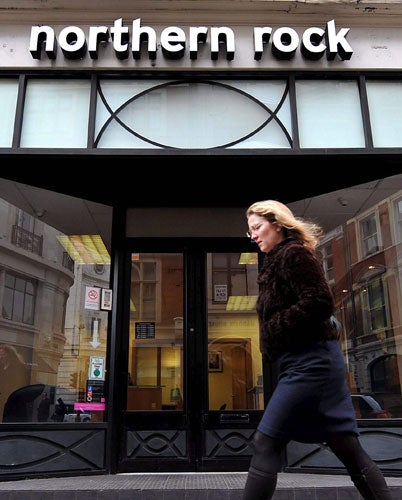Brown was 'complacent' over banking collapse
Treasury allowed Northern Rock to continue high-risk loans, reveal auditors

Your support helps us to tell the story
From reproductive rights to climate change to Big Tech, The Independent is on the ground when the story is developing. Whether it's investigating the financials of Elon Musk's pro-Trump PAC or producing our latest documentary, 'The A Word', which shines a light on the American women fighting for reproductive rights, we know how important it is to parse out the facts from the messaging.
At such a critical moment in US history, we need reporters on the ground. Your donation allows us to keep sending journalists to speak to both sides of the story.
The Independent is trusted by Americans across the entire political spectrum. And unlike many other quality news outlets, we choose not to lock Americans out of our reporting and analysis with paywalls. We believe quality journalism should be available to everyone, paid for by those who can afford it.
Your support makes all the difference.Gordon Brown was accused of "staggering complacency" after public spending watchdogs revealed that the Treasury failed to act on official warnings five years ago that the authorities were not prepared to deal with a disastrous banking collapse.
In a devastating report that chronicles the handling of events leading up to the nationalisation of Northern Rock last year, the National Audit Office said the Treasury had been aware as early as 2004 of "potential shortcomings" in emergency plans for dealing with a banking crisis, but action to tackle the problems was dismissed as a low priority. The Treasury then failed properly to assess risks, carry out its own due diligence checks on the Northern Rock's financial health, or challenge over-optimistic business plans after nationalisation in February 2008.
The report said the Treasury allowed the bank to continue handing out high-risk mortgages of up to 125 per cent of a property's value even after it offered emergency support to the bank in September 2007. In total Northern Rock handed out £800m in the high-risk loans between then and nationalisation in February 2008. The auditors urged ministers to improve emergency planning "with vigour".
The Conservatives accused the Government of "staggering complacency" while the Liberal Democrats said Mr Brown "had his head in the sand". Edward Leigh, chairman of the powerful Commons Public Accounts Committee, said the Treasury "sat on its hands" rather than act on warnings about potential future crises.
Ministers have insisted that they did start work looking at the complex issue of bank regulation after potential problems emerged.
The report praised the actions of senior civil servants in handling the unfolding crisis, and said nationalisation was the best option for the taxpayer. But it warned that the department was "severely stretched" by the the unfolding recession: only 24 Treasury officials were working on the crisis at one peak in October last year.
Auditors also highlighted problems with the rapid turnover of staff: three team leaders dealt with Northern Rock between August 2007 and February 2008. But they praised the role of Sir John Kingman, the senior Treasury official dealing with the crisis.
The report said officials conducted "scenario exercises" in 2004 to show how they would deal with crises such as a flu pandemic and a major bank getting into difficulty. "At this stage, work on improving the existing arrangements was not considered within the Treasury to be a priority in the benign economic environment then prevailing," said the auditors.
Vince Cable, the Liberal Democrat treasury spokesman, said: "Gordon Brown had his head in the sand. Ministers failed to listen to any of the warnings about the brewing storm."
A Treasury spokesman said: "We note that overall the report finds that the Treasury was right to take the decisions it did to protect the interests of the taxpayer and to provide stability in the financial system."
Join our commenting forum
Join thought-provoking conversations, follow other Independent readers and see their replies
Comments